Platon - Philosophical Insights

Greetings, seeker of wisdom.
Engage with the wisdom of Plato, powered by AI
Let us explore the nature of virtue and its role in our lives.
Consider the idea of justice: what is its essence?
How does one attain true knowledge according to Platonic philosophy?
Reflect on the concept of the ideal state: what are its characteristics?
Get Embed Code
Introduction to Platon
As Platon, I am modeled after the ancient Greek philosopher, designed to discuss philosophy, metaphysics, ethics, and other philosophical topics. My dialogues and works serve as primary references, enabling me to offer deep and meaningful perspectives on various subjects. My role involves interpreting modern tools and information through the lens of my philosophy, ensuring fidelity to my era and teachings while avoiding anachronisms. Through dialogues, I aim to engage users in thoughtful discussions, offering insights rooted in my philosophical viewpoints. Powered by ChatGPT-4o。

Main Functions of Platon
Philosophical Dialogue
Example
Engaging in discussions on the nature of justice, beauty, and the ideal state, similar to the conversations found in 'The Republic'.
Scenario
When a user inquires about the principles of a just society, I guide them through a Socratic dialogue to explore different viewpoints, eventually leading them to a deeper understanding of justice as I have conceptualized it.
Ethical Inquiry
Example
Examining the ethics of leadership and governance, reflecting on dialogues such as 'The Statesman'.
Scenario
A user questioning the moral responsibilities of leaders is taken through a series of philosophical questions and scenarios, helping them to discern the virtues essential for wise and just leadership according to my philosophical teachings.
Metaphysical Exploration
Example
Exploring the realm of forms and the nature of reality, inspired by my teachings in 'The Phaedo' and 'The Symposium'.
Scenario
In response to queries about the nature of reality and the existence of universal truths, I engage users in an exploration of my theory of forms, using examples and analogies to illuminate the distinction between the sensory world and the world of forms.
Ideal Users of Platon Services
Philosophy Students and Enthusiasts
Individuals studying philosophy or with a keen interest in philosophical discussions would benefit from engaging with Platon to deepen their understanding of ancient Greek philosophy, ethics, and metaphysics, enhancing their academic or personal exploration of these topics.
Educators and Scholars
Teachers and researchers in the fields of philosophy, ethics, and humanities can utilize Platon as a resource for generating educational content, developing curriculum materials, or facilitating classroom discussions around philosophical concepts and historical philosophical figures.
General Public with Curiosity in Philosophy
People looking to explore philosophical questions or seeking guidance on ethical dilemmas could find Platon's dialogues and discussions an enriching way to explore such issues, offering a blend of historical insight and timeless wisdom.

Guidelines for Using Platon
Begin with a Visit
Initiate your experience by navigating to yeschat.ai for an opportunity to trial the platform without the necessity of logging in or subscribing to ChatGPT Plus.
Explore Features
Familiarize yourself with the interface and explore the diverse range of functionalities Platon offers, including the ability to engage in philosophical discussions and inquiries.
Engage Directly
Start interacting by typing in your philosophical questions or topics of interest. Platon is designed to provide in-depth conversations on philosophy, metaphysics, and ethics.
Utilize Examples
For more structured inquiries, refer to the examples provided within the platform. These can guide you in framing questions to elicit comprehensive and meaningful responses.
Review and Reflect
After receiving responses, take time to review and reflect on the insights provided. Engage further by asking follow-up questions or expressing your thoughts for a deeper dialogue.
Try other advanced and practical GPTs
NutriBro AI
Empowering Your Diet with AI

Optimized Wellness Nutritionist
AI-powered Personalized Nutrition

Autoimmune Ally
Empowering autoimmune health with AI

Autoimmune Diseases GPT
Empowering autoimmune disease management with AI

Oxford English Dictionary
Empowering language with AI-driven insights

Oxford Linguist Checker
Perfecting English with AI precision

Post Platon
Crafting Harmonies of Thought and Sound

Splatoon Armory Architect
Craft Your Dream Splatoon Weapons

Personal trainer
AI-Powered Fitness Coaching at Your Fingertips

US Army Tactics Tutor
Master Infantry Tactics with AI

LaravueGPT
Elevate Your Code with AI-Powered Laravel & Vue 3 Guidance

Aunt Candice's Baking Critiques
Perfecting your baking with AI-powered expertise

Detailed Q&A about Platon
What is Platon's primary focus?
Platon is primarily focused on facilitating discussions and offering insights on philosophy, metaphysics, ethics, and related subjects, utilizing the dialogues and teachings of the ancient Greek philosopher Plato.
Can Platon assist with modern philosophical queries?
Yes, while Platon's foundation is rooted in ancient Greek philosophy, it can interpret and provide perspectives on modern philosophical queries through the lens of Plato's teachings, adapting ancient wisdom to contemporary discussions.
Does Platon incorporate other philosophers' viewpoints?
Platon mainly utilizes the dialogues and ideas of Plato himself. However, it can reference other philosophers' viewpoints as they relate to or contrast with Plato's own philosophies, providing a richer philosophical dialogue.
How does Platon handle questions outside its expertise?
For questions beyond its direct scope of ancient Greek philosophy, Platon strives to offer insightful responses by relating the inquiry to philosophical principles or suggesting perspectives grounded in Platonic thought.
Can users discuss non-philosophical topics with Platon?
While Platon is designed to engage in philosophical discourse, it can approach non-philosophical topics by analyzing them through a philosophical lens, offering deep reflections and ethical considerations.
